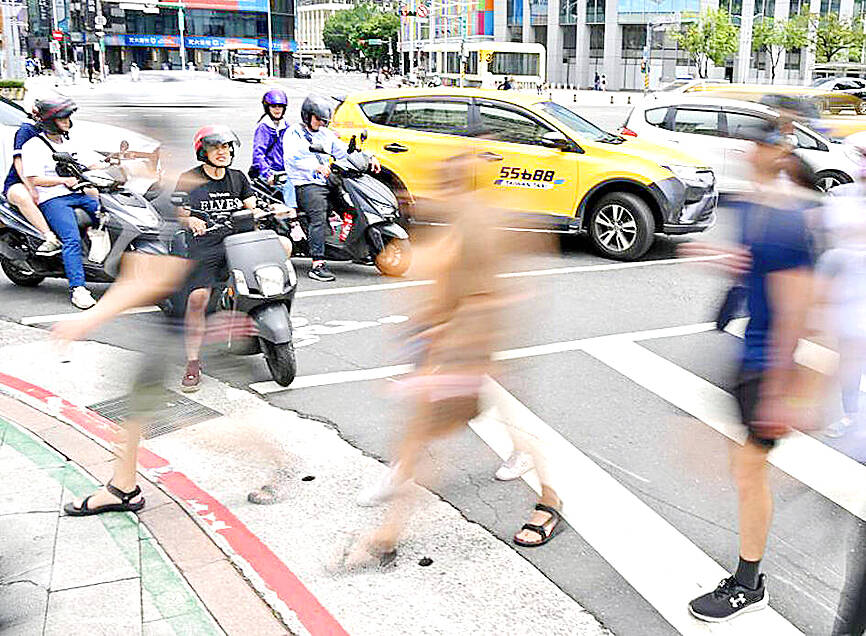The National Audit Office said it would ask the Cabinet to gather ministries to analyze the issue of driving under the influence of medication and review traffic regulations, as more people were estimated to have died from it than from traffic accidents involving alcohol last year.
More than 300 people die in traffic incidents in which a driver is impaired by medication every year, while 253 people had died in alcohol-related traffic incidents last year, the Taipei Pharmacists Association said.
A Taipei City Hospital survey showed that about one-third of the respondents had taken medicine before driving, with the most common being hypoglycemic agents (to lower blood sugar level), hypnotics and muscle relaxants, the audit office said.

Photo: Tu Chien-jung, Taipei Times
Commonly taken medicines often have side effects such as sleepiness, dizziness, reduced concentration and loss of coordination, it said.
Another survey by the association on 300 professional drivers of taxies, tour buses and heavy trucks showed that 19.5 percent had taken hypoglycemic agents, hypnotics or muscle relaxants before driving.
In general, people in Taiwan are unaware of the seriousness of driving under the influence of medication, but the Road Traffic Management and Penalty Act (道路交通管理處罰條例) only regulates and punishes driving under the influence of illicit drugs, hallucinogens, narcotics and other similar controlled drugs, the office said.
As the act does not regulate or punish driving under the influence of medication, it might be difficult to increase people’s awareness on its seriousness, it said.
Referencing the drug classification methods in France, the association and Taipei City Hospital have established a traffic safety drug classification system for Taiwan and are using it to raise public awareness.
In Hong Kong, people who drive under the influence of drugs that are not classified as illicit, but deprives them of their normal mental or physical faculties and seriously affects their ability to drive, might be subject to penalties.
They can be fined up to HK$25,000 (US$3,206) or sentenced to three years in prison, Hong Kong’s Road Traffic Ordinance says, adding that first-time offenders would have their driver’s license suspended for six months while it would be at least two years for the second offense.
The dangers of driving under the influence of medication is no less than that of alcohol or illicit drugs, but most people are unaware of it, which poses road safety risks, the office said.
The office said it has notified the Executive Yuan, asking it to gather the Ministry of Transportation and Communications and the Ministry of Health and Welfare to reference the road safety drug classification systems in other countries and improve the driving under the influence of medication prevention and control mechanism in Taiwan.
They can also use the National Health Insurance data to analyze the medicines that endanger driving safety, raise public awareness through hospitals and clinics, and review the traffic regulations and relevant penalties, it said.

An undersea cable to Penghu County has been severed, the Ministry of Digital Affairs said today, with a Chinese-funded ship suspected of being responsible. It comes just a month after a Chinese ship was suspected of severing an undersea cable north of Keelung Harbor. The National Communications and Cyber Security Center received a report at 3:03am today from Chunghwa Telecom that the No. 3 cable from Taiwan to Penghu was severed 14.7km off the coast of Tainan, the Ministry of Digital Affairs said. The Coast Guard Administration (CGA) upon receiving a report from Chunghwa Telecom began to monitor the Togolese-flagged Hong Tai (宏泰)

EVA Air is prohibiting the use of portable chargers on board all flights starting from Saturday, while China Airlines is advising passengers not to use them, following the lead of South Korean airlines. Current regulations prohibit portable chargers and lithium batteries from check-in luggage and require them to be properly packed in carry-on baggage, EVA Air said. To improve onboard safety, portable chargers and spare lithium batteries would be prohibited from use on all fights starting on Saturday, it said. Passengers are advised to fully charge electronic devices before boarding and use the AC and USB charging outlets at their seat, it said. South

WAR SIMULATION: The developers of the board game ‘2045’ consulted experts and analysts, and made maps based on real-life Chinese People’s Liberation Army exercises To stop invading Chinese forces seizing Taiwan, board gamer Ruth Zhong chooses the nuclear option: Dropping an atomic bomb on Taipei to secure the nation’s freedom and her victory. The Taiwanese board game 2045 is a zero-sum contest of military strategy and individual self-interest that puts players on the front lines of a simulated Chinese attack. Their battlefield game tactics would determine the theoretical future of Taiwan, which in the real world faces the constant threat of a Chinese invasion. “The most interesting part of this game is that you have to make continuous decisions based on the evolving situation,

Actor Lee Wei (李威) was released on bail on Monday after being named as a suspect in the death of a woman whose body was found in the meeting place of a Buddhist group in Taipei’s Daan District (大安) last year, prosecutors said. Lee, 44, was released on NT$300,000 (US$9,148) bail, while his wife, surnamed Chien (簡), was released on NT$150,000 bail after both were summoned to give statements regarding the woman’s death. The home of Lee, who has retreated from the entertainment business in the past few years, was also searched by prosecutors and police earlier on Monday. Lee was questioned three